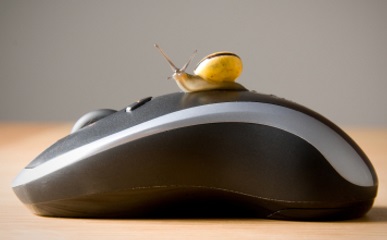
Most likely, you know how frustrating it can be to use sluggish desktops and laptops. You’re probably reading this article on one right now. But, did you know that your computer slowing down is likely because of how you’re using it? It can be the programs you’re running, the files you’re downloading that are slowly filling up your hard drive, or it could be a virus that you mistakenly installed on your computer.
We’ve taken the time to collect five of the most common reasons why your computer could be running slow, and what you can do to speed it up a bit.
- Too many programs open or running. Sure, you can theoretically do a million things at once, but to do so quite literally requires an extremely powerful computer. Unfortunately, not all of us have access to such a computer. Most of us only have a computer that can run so many programs at once before it starts slowing down, or in worse cases, crashes altogether. Fortunately, all you need to do to solve this very simple problem is shut down or quit any programs that you currently aren’t using and in the case of browsers, learn how to bookmark pages and links so you don’t have to keep them open all the time.
- Your hard drive or memory could use an upgrade. Your computer will also slow down if your hard drive is nearly full, or if you’re constantly maxing out your computer’s memory performance. The solution to this is rather simple – it’s either you upgrade your hard drive and/or memory or delete files that aren’t being used and remove any unnecessary programs that may be running in the background.
- Unnecessary software updates and “bloatware”. If you’re not careful, you might be installing programs and applications that have automatic updates activated, or come pre-packaged with other unnecessary software without you knowing. Both can take up valuable hard drive space and slow down your computer’s performance. Not to mention it can put your computer at significant risk. Always remember to double-check whatever you’re installing on your computer.
- Too many applications running at start-up. Like how some applications can have automatic updates activated, some are programmed to run automatically during start-up unless the settings are changed. This can sometimes be useful, but more often than not, it’s a nuisance and can significantly affect performance, especially in older desktops and laptops. Making sure that only necessary applications are running on start-up can help speed up your computer’s performance.
- A virus might be slowing your computer down. Plenty of viruses can infect your computer without you ever knowing, running silently in the background and collecting important information, including passwords, financial information and so on. As such, it’s important to install an anti-virus solution, even if only free and basic, to help minimize the chances of your computer being infected by a virus. It’s also a good idea to avoid downloading and installing anything from suspicious and unsecure links or websites.
The more you know about maintaining your computer, the faster and more efficient your computer will be. And, with these tips, your desktop and/or laptop will be running faster than it ever has!
